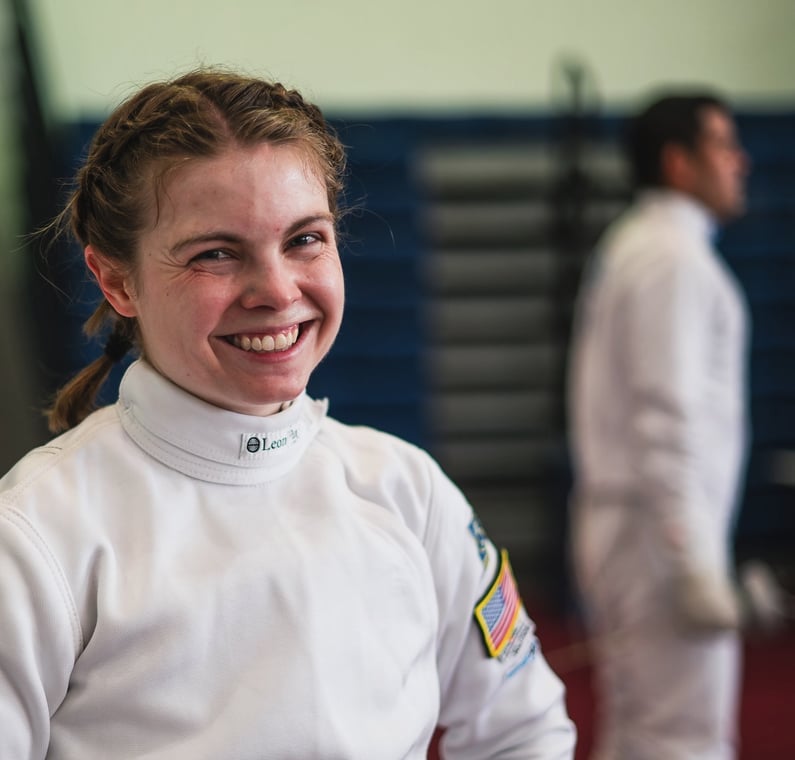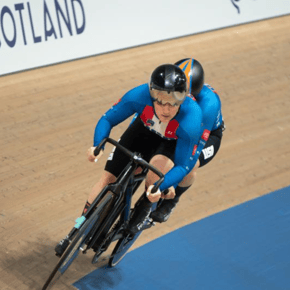 Source: Mary Zoldak
Source: Mary Zoldak
The fact that Mary had an hour to do the interview for this piece should not be taken for granted.
Mary Zoldak is a modern pentathlete, which involves training for 5 different sports. She also works a full time, 40 hour week job. How she has time for all of it we may never know, but we’re so excited to introduce her to you.
Mary grew up on her family’s farm in Rushsylvania, Ohio. When you think farm, think bigger. Think 1,500 acres big. Mary didn’t grow up taking care of a few chickens: she grew up understanding how to manage limited time in unlimited space, how to bale acres of hay from sun up to sun down, and keep her mental, emotional and physical cool during the hottest days of the summer. Mary was a self-described mediocre athlete as a child, never quite excelling at anything, but unwilling to give it up. It may seem counter intuitive, but I’ve spoken to more elite and professional athletes who started out in this way than on the gifted track. A healthy dose of mediocrity ensures a healthy work ethic and often engages a longer commitment to sport than early success.
Early success can mean a lack of early barriers, and consequently leaves young phenoms ill-equipped to deal with challenges later on.
Family ties and a strong business program drew Mary down south, where she attended college at Baylor University. Mary was on the equestrian team all three years she spent in Waco, but, due to a number of reasons, she never actually competed. This experience could have left her bitter, but Mary speaks about her time with the team fondly. She says she treasured the hours she spent caring for the horses, and barn work helped take her mind off her studies a few times a week.
A horse girl through and through, the Olympics has always excited Mary. After watching dressage and equestrian every four years, she would dutifully tune into modern pentathlon. If it had horses, Mary was there. At the time, modern pentathlon included five sports: running, shooting, equestrian show jumping, swimming and fencing. However, after Tokyo, 2021, it was announced that the Paris Games in 2024 would be the final ride. For the Los Angeles Games in 2028, the riding portion of the modern pentathlon will be replaced by an obstacle course: no horse required. Part of the reason for the change is that modern pentathlon employed catch riding: a system in which athletes draw random lots for horses during competition. Catch riding requires an incredible amount of skill to do properly, as it forces athletes to immediately bond with and control an unknown and untested equine teammate. Mary was tired of hearing “horse riding isn’t hard, you just sit there,” and wanted to shift the narrative. She was eager to prove, both to the world and herself, that catch riders and equestrians are athletes, and that show jumping belongs on the world stage right alongside fencing or shooting. Although three years was perhaps a tight timeline to master a brand new sport and earn a spot at the Paris Olympic Games, Mary knew she had to try: she wanted to be a part of that final ride.
 Source: Mary Zoldak
Source: Mary Zoldak
Mary had experience with running, swimming and riding, having joined the Baylor club triathlon team in addition to her equestrian participation to scratch the competitive itch that barn work couldn’t quite reach. She also had grown up shooting rifles, so firing a laser pistol wasn’t completely novel. However, the fencing monde of sabres and épées, with its white outfits and strange masks, was brand new to Mary. Fencing requires an impressive amount of equipment and technical know-how, and comes with a staggering price tag. For instance, the monthly membership at Mary’s local fencing gym costs close to $500. As a newcomer, Mary would need extensive individualized coaching on top of equipment and membership costs if she had a hope of reaching her Parisian dream.
 Source: Mary Zoldak
Source: Mary Zoldak
Budgeting for modern pentathlon became a sixth sport Mary has had to squeeze into her already busy schedule. USA Modern Pentathlon is not able to provide any funding to its athletes, so every step of this journey, both large and small, has been financed by Mary and her family. Mary joked that she and her husband have become experts at excel budget spreadsheets, and masters of booking travel with credit card points.
The United States is one of the only countries in which Olympic sports are not government funded. In more cases than not, athletes are expected to bear the majority of their training, living and competing expenses. The financial burden of excellence in sport is staggering, and gender only compounds the issue. In fact, according to a study we conducted last year, 50% of female athletes surveyed “earned no net income after accounting for out-of-pocket expenses related to their sport.” Mary has yet to make a dollar competing at the national or international level.
 Source: Mary Zoldak
Source: Mary Zoldak
Mary says she has worked hard to feel as though she belongs when she shows up to a competition fresh off a flight she booked, weighed down by overburdened baggage carts that she carries, to check into a hotel that she paid for. She pays her own competition fees, arranges her own transportation logistics, and does it all while holding down a full-time job. She looks around at her European competitors who have had systemic support in modern pentathlon since childhood, and finds it hard to believe she is equally as worthy of a spot in any competition, much less the Olympic Games. However, the only thing differentiating Mary from her competitors is the existence of sustained systemic support. What makes her European competitors feel superior, and Mary and her teammates inferior, is something entirely outside of Mary’s control. So it shouldn’t follow that a Hungarian modern pentathlete gets to put “professional modern pentathlete” in her Instagram bio, and Mary doesn’t.
Even if Mary wanted to put “professional athlete” in her Instagram bio, she’s so much more than those two words.
While she might, at times, feel envious of lucrative sponsorship deals and catered meals, Mary has a whole other life outside of sport. Throughout her career as an attorney Mary has worked to change regulations, serve clients and solve tough problems. Being an attorney has helped give her a sense of purpose outside sport, and a place to put her mind to work after her body is exhausted. However her modern pentathlon journey plays out, Mary has represented her country in so many ways already, and will continue to have a brilliant career.

Source: Mary Zoldak
Qualifying a spot at the Olympics in modern pentathlon is a lot like qualifying a spot in any other sport: and by that I mean that every single sport has its own special rules and regulations and each one is incredibly difficult to understand. But essentially it’s a combination of quota slots and a ranking list, and Mary has to either earn one or rank very highly on the other. Despite putting her whole heart, all of her effort and almost her whole paycheck into modern pentathlon for three years, Paris wasn’t in the cards for this big dreamer. While Mary has mourned not getting to be a part of the historic last ride, the death of the 2024 dream quickly turned into the birth of the 2028 version. She realized her Olympic dream had grown beyond the Champs Elysee, and she wasn’t quite ready to call it quits just yet. Big dreams take us to the craziest places, and we can’t wait to watch Mary chase hers all the way to the top.





